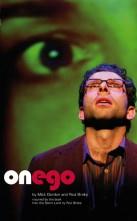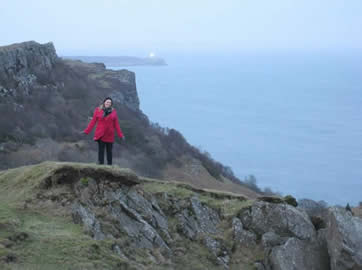Emil's Epilogue -
September 2011
Gustie Psych
News & Events
Welcome to the first (abbreviated) issue of the GAC pyschology newsletter for the 2011/2012 academic year! And welcome to a brand new, beautiful academic hall!
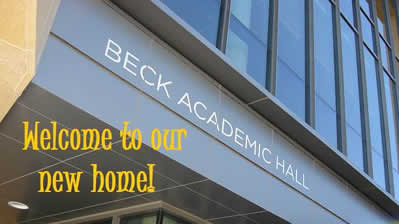
Goodbye SSC and hello Beck Hall!
This brand new 125,000 square foot building on campus has brought a great deal of excitement to the Psychology Department. It has been named after Warren and Donna Beck who have supported Gustavus Adolphus for a number of years. It will be dedicated at 10:30 a.m. on the morning of October 1, 2011 in the West Mall acknowledging their support and generous gift to Gustavus.
Beck Academic Hall boasts numerous advancements and features that will enhance the academic program of the Psychology department. Along with the new classrooms, desks, chairs, offices, computers, etc, Beck Hall will also give the department the necessary space for sophisticated lab equipment. The building is equipped with discrete advantages such as the natural lighting that automatically adjusts to the light provided from the outdoors. This will reduce electrical costs and also positively affect the teaching and learning areas. The biggest thrill of all seems to be the anticipation of the new rooms and labs.
Professors and students will now have opportunities to explore a deeper realm of the Psychological Sciences. Throughout the three floors of this beautiful building, there are labs for developmental, cognitive, neuroscience and many other branches of Psychology. Each area will be able to focus on their own specific studies.Professor Ackil comments “The lab suites are incredible. They have been arranged around a common area that serves as a shared space so that students can work and interact together sharing ideas.”
So what do the professors and students think?
“It’s nice to have a lot more organized space to do research and I am looking forward to using the new neuroscience lab equipment.” – Psychology Major, Emily Lindberg
“I have already had the opportunity to use an EEG within the first couple weeks this year. It was exciting to examine the brain waves and I am looking forward to what else we get to try next.” – Psychology major, Caroline Hendrickson
Professor Walker is looking forward to working in a new classroom. The advanced technology will give not only the teachers opportunities to try new things, but also the students. “It is a warm and exciting environment for students to work together with faculty members,” she says. Regarding the new lab equipment, Walker is looking forward to utilizing the new  technology. The cameras and microphones allow for actual recordings of behavior. It will now be possible to identify details within research through observation and zooming in on interactions to not only hear verbal conversation but also witness nonverbal cues. This opens the door for new research and studying of interactions and group dynamics. Another exciting point is that with all the space, multiple subjects can be run simultaneously.
technology. The cameras and microphones allow for actual recordings of behavior. It will now be possible to identify details within research through observation and zooming in on interactions to not only hear verbal conversation but also witness nonverbal cues. This opens the door for new research and studying of interactions and group dynamics. Another exciting point is that with all the space, multiple subjects can be run simultaneously.
“For the first time, Psychology students have a space that they can call their own.” – Professor Ackil. Students have the opportunity to make use of the student interaction room. They can use it anytime and it is an excellent way to get together to meet with a  group or just sit and study in a quiet and comfortable space. This room is located on the second floor in room 271.
group or just sit and study in a quiet and comfortable space. This room is located on the second floor in room 271.
“I am most excited about the equipment that we now have. It has either been updated or is entirely new. Not only can we use this new technology for research but also for classes. The professors can completely redesign the way that they teach classes.” – Professor Hecht
There is much to look forward to this year and this is only the beginning of the excitement. As school continues throughout 2011 and 2012, psychology students will make great use of this wonderful new asset to the school.
by Mandy Feeks
[Mandy is a Junior Honors Psychology major from Apple Valley, MN. She is a member of Psi Chi, involved in Intramural Sports and hopes to join BPLP this year. Mandy is a student assistant in the psychology department and a staff member of this newsletter.]
We all know what a wonderful time of the year the Nobel Conference represents. For two days, mid-way through the week, no classes are held. On top of that, if you wish, you can attend the always intriguing talks by leaders in their fields, on which you won’t be tested! And, if you do decide to go to the conference (which you should…), more often than not, professors will give extra-credit in exchange for a brief summary of the talks.
Now, this year… it gets even better. Aside from the intellectual nourishment that an occasion such 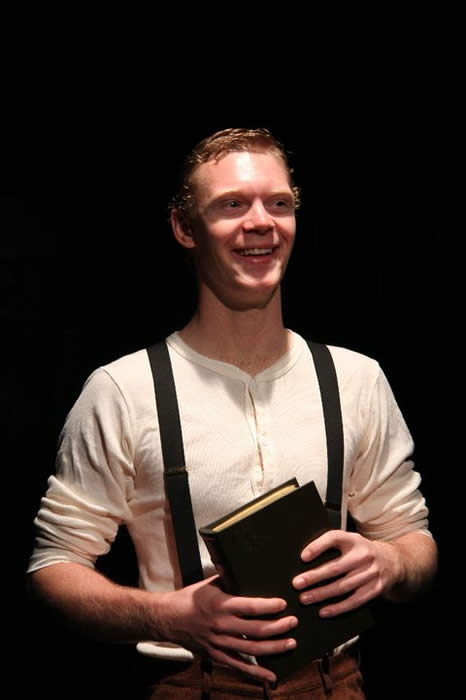 as the Nobel Conference, The Brain and Being Human, represents; this year, those who also enjoy of an artistic and perhaps even philosophical approach to the question of human consciousness and identity, will have their needs met. As part of the Conference, on Tuesday, October 4, the Department of Theatre and Dance will be presenting a special performance of On Ego, a play by Mick Gordon and neuropsychologist Paul Broks, inspired by the book Into the Silent Land by Paul Broks, directed by Assistant Professor of Theatre Henry MacCarthy. The play, called “totally gripping theatre” by the Sunday Times, addresses how the brain creates a sense of self. How does the darkness inside our skulls become a world of people and places, pleasure and pain, love and loss? On Ego is an exploration of
as the Nobel Conference, The Brain and Being Human, represents; this year, those who also enjoy of an artistic and perhaps even philosophical approach to the question of human consciousness and identity, will have their needs met. As part of the Conference, on Tuesday, October 4, the Department of Theatre and Dance will be presenting a special performance of On Ego, a play by Mick Gordon and neuropsychologist Paul Broks, inspired by the book Into the Silent Land by Paul Broks, directed by Assistant Professor of Theatre Henry MacCarthy. The play, called “totally gripping theatre” by the Sunday Times, addresses how the brain creates a sense of self. How does the darkness inside our skulls become a world of people and places, pleasure and pain, love and loss? On Ego is an exploration of 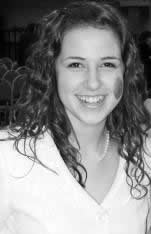 identity, humanity, and what it means to be unique. And, it involves teletransportation.
identity, humanity, and what it means to be unique. And, it involves teletransportation.
Incredibly talented seniors, Ben Kolis and Chloe Radcliffe, will be joined by invited artist Robert Gardner, in the performance of this show to which all (and especially Psychology majors!) are invited! So get your tickets soon! If you can’t make it to the premier on 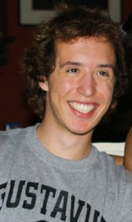 October 4th at 8:15pm, make sure to attend the show either on Friday, October 7th; Saturday, October 8th (both of those at 8:00pm); or to the final performance at 2:00pm on Sunday, October 9th.
October 4th at 8:15pm, make sure to attend the show either on Friday, October 7th; Saturday, October 8th (both of those at 8:00pm); or to the final performance at 2:00pm on Sunday, October 9th.
[Jean-Paul is a Senior Psychology Honors major and Neuroscience Minor. He is also a Spanish Tutor and a Psychology Academic Assistant. Jean Paul is employed as a student assistant in the Psychology Department and is a member of the Emil's Epilogue staff. This semester Jean-Paul is equally serving as a dramaturge for On Ego. Currently applying for a Fulbright Scholarship, he intends to eventually attend graduate school for Cognitive Neuroscience.]
I had to clarify so many times - I kind of just gave up correcting people – that I was not going to Ireland, I was going to Northern Ireland. No, ‘Northern’ does not simply relate to the geographical location of the country. And yes, it is its own country, smaller than the size of Connecticut but filled to the brim with a complex history and a beautiful future.
Norn
Iron (which is what Northern Ireland sounds like when someone says it
with the accent), is a part of the United Kingdom and for the last
hundred years the Conflict has torn this country in half. For those who
are say a little bit older than the babes that seem to be gracing Beck
halls these days, you probably have heard of Northern Ireland before –
and most likely not in the best way. For decades this small piece of
land has been the battleground for two extreme ideologies. You have
probably heard of the Troubles in the 1980’s, where riots and petrol
bombs filled city streets and how the fighting was between Protestants
(those who identify themselves as British) and Catholics (those who
identify themselves as Irish). But there are so many more layers to the
Conflict than simply the label of religions; I mean people come to
Belfast (the capital) to write theses and dissertations on the Troubles,
the Conflict and the Peace Process. I know I would not be doing anyone
justice if I tried to explain everything in this one post (even
though I really want to, since I think NI is my new favorite topic to
talk about), but to save time and space, the most basic explanation
is that from Paul Diron, “Northern Ireland can be seen as a place where the
British and the Irish nations overlap and their co-nationals, British
unionists and Irish nationalist, aspire to be part of two different
states on one piece of land.” 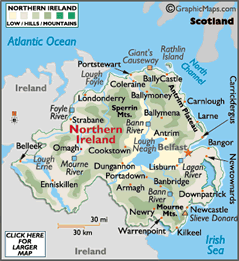 Seems simple enough on the outside, as you
ask yourself why they just can’t get along and live side by side. But if
reflect more deeply, you see that the Conflict is not simply over land but rather it is about attacking individuals’ identity. The Irish
nationalists are saying that they are fighting British imperialism but in
reality they are fighting the people who live across the town who have for generations
identified themselves as Irish-Scotts or British. People
start out saying they are fighting an ideology but end up only fighting
neighbors.
Seems simple enough on the outside, as you
ask yourself why they just can’t get along and live side by side. But if
reflect more deeply, you see that the Conflict is not simply over land but rather it is about attacking individuals’ identity. The Irish
nationalists are saying that they are fighting British imperialism but in
reality they are fighting the people who live across the town who have for generations
identified themselves as Irish-Scotts or British. People
start out saying they are fighting an ideology but end up only fighting
neighbors.
So this is the history that I stepped into when I went abroad the Spring of 2011. My friends and family questioned me as to why I would want to go to this place and why would I ‘waste’ my study abroad doing a program that had me working in an internship instead of traveling. But I knew I wanted to do HECUA’s Northern Ireland Program and I wouldn’t trade my time there for the world! So in January I hopped onto a plane with thirteen other Americans to go to Northern Ireland to study the Social Democracy and Social. There we met up our program director Nigel Glenny, a professor at the Ulster University studying how the Peace Process can change the education system. Together we spent the first two and half weeks in a classroom learning about the Conflict, who the key players were, and about how Northern Ireland is moving forward. Those few weeks were some of the hardest I have ever had at school, not specifically academically but because of the breadth of understanding necessary to be involved in this program. There is so much happening in Northern Ireland and it is impossible to simply pick who is right and who is wrong. With every event, we were asked to process it with our head (intellect), our heart (emotions), and our gut (instinct/spirit).
During this time together, we had to decide which student was placed in which internship, mildly nerve-wracking because there were multiple students who wanted the internship that I wanted. Each internship was unique as to where the student would be working or with whom but they all held the opportunity to see the Peace Process in practice not just in theory. After we finally felt that we had our legs under us and an understanding of the country we were sent to two different cities, half us went to Derry/Londonderry and I went with five others to Belfast – a little terrified but beyond excited we entered into the real world of Northern Ireland.
Simply, I was so blessed to be able to work at East Belfast Mission! EBM is non-profit organization that worked in the fourth poorest district in the entire UK; their mission is to raise the general well-being of the entire neighborhood. Located on the Lower Newtownards Road, EBM works with a mostly Protestant community. Yet, across the street is one of the tallest Peace Walls, a giant fence marking an interface (where Catholic and Protestant homes meet) separating Lower Newtownards Rd and the Short Strand, a Catholic street.
Even though I worked at an interface, it was not like every day there was violence nor was I working with ex-paramilitary all the time. It would be naïve to ignore the ripples of the past since they are still affecting this community’s present and future. Many people my age whom I met in Inner East Belfast have had a father or uncle who died due to the Conflict, the hurt and loss is still very real to so many people. During my time in Inner East Belfast the pain of the past was definetly a real part of my reality but what was more powerful was the hope that I observed. Witnessing first hand that radicals are not the ones who kill for what they believe, but instead it is those who strive for peace; it is those who forgive the unforgiveable. The people that I worked for were the best in their field but chose to leave their well-paying jobs to live a life of servitude to this community. EBM has the ability to touch so many lives and helps in so many ways; everything from homeless shelters, to second-hand clothing shops, and community gardens. EBM truly tries to present the community with opportunities; they are teaching the community how they can help themselves and each other.
 For
my internship, I worked in the Community Team, which allowed me to
experience everything that EBM did and to just fill in as an extra pair of
hands for what was needed. Every day was different and amazing, I could
be working in the kitchen, cooking inexpensive but healthy meals and
then the next working alongside a mixed Protestant/Catholic women’s
group focusing on single and shared identity. I got to have lunch with
ex-paramilitaries who are now community leaders for peace and hear
amazing talks by other organizations. However, my favorite place was the
Employability Offices where I worked with the counselor helping people get
into job placements. There were so many people who would come in and had
never had a job in their entire lives - and many of their family members had never
been employed either. EBM gave them the opportunity to sign up with the
office free of charge. We would work on reading and writing skills,
training them in how to work in a job environment but also offered group
and individual sessions that focused on self-esteem and self-confidence.
As a part of the EBM family I learned much about who I am and
what I want to do with my life. Through my experiences I came to the
realization that I really could dedicate my entire life to
reconciliation and The Peace Process. Being in that community gave me
the language to express my hopes and the permission and tools to follow
them.
For
my internship, I worked in the Community Team, which allowed me to
experience everything that EBM did and to just fill in as an extra pair of
hands for what was needed. Every day was different and amazing, I could
be working in the kitchen, cooking inexpensive but healthy meals and
then the next working alongside a mixed Protestant/Catholic women’s
group focusing on single and shared identity. I got to have lunch with
ex-paramilitaries who are now community leaders for peace and hear
amazing talks by other organizations. However, my favorite place was the
Employability Offices where I worked with the counselor helping people get
into job placements. There were so many people who would come in and had
never had a job in their entire lives - and many of their family members had never
been employed either. EBM gave them the opportunity to sign up with the
office free of charge. We would work on reading and writing skills,
training them in how to work in a job environment but also offered group
and individual sessions that focused on self-esteem and self-confidence.
As a part of the EBM family I learned much about who I am and
what I want to do with my life. Through my experiences I came to the
realization that I really could dedicate my entire life to
reconciliation and The Peace Process. Being in that community gave me
the language to express my hopes and the permission and tools to follow
them.
I don't actually feel like I missed out on a semester because I studied psychology my entire time I was in Northern Ireland. It was fascinating and exhilarating to see theories I learned about in the classroom be put into action in such a unique way. I have seen how psychology has helped people rebuild the lives of themselves and their families. To me, the Conflict in today’s culture boils down to people’s identities and what people do when they feel that their identities are being threatened. Just like soldiers who return home from war, after experiencing heightened levels anxiety, they find it hard to not see danger around every corner. Similarly there are people in East Belfast who had been fighting to protect themselves and their loved ones for so long that now in the Peace Processes that they still feel in danger. Everyone lost a bit of themselves, a sense of safety and pride because of the Troubles. So in order to take the next step forward I believe that psychology will need to play an even bigger role in community and family development.
I
think I fell in love with Northern Ireland before I even touched the
ground. When I caught my first glimpse of the country through the fog
all I saw were fields, an absolutely breathtaking patchwork of emerald,
forest, and kelly greens separated by hedges and dotted with sheep.
Every photo I’ve seen, every picture I could have imagined paled in
comparison to the beauty that is Northern Ireland. I learned that my
initial love was a forever kind when I met the people who lived there.
More breathtaking than the landscape are the people who have loved their
country, their families and their future so deeply. I am honored to
have had the opportunity to walk along side these people, to call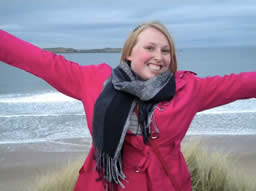 them
my friends. It would have been impossible to do Community and Family
development if I had not opened my heart to the people of Inner East
Belfast, I grew to love those people and give them a bit of myself in
return. I left a piece of my heart in Belfast the day I flew back to
Minnesota but I know one day I will go back to get it.
them
my friends. It would have been impossible to do Community and Family
development if I had not opened my heart to the people of Inner East
Belfast, I grew to love those people and give them a bit of myself in
return. I left a piece of my heart in Belfast the day I flew back to
Minnesota but I know one day I will go back to get it.
[Gwynneth (Wynne) Thompson is a senior Psychology major, with minors in Religion and Peace Studies. She is a student assistant in the Psychology department and a Peace Studies Academic Assistant. Wynne is also a Gustie Greeter, Proclaim Leader, Chaplin Apprentice and involved in Wednesday Friends and Study Buddies. Her future plans are to wake up every morning and smile, to be grateful for what she has, and to live a life of love and service. She plans to eventually attend grad school for community/family development and counseling as a part of the Peace Process. In the next few years she hopes to return to EBM as a full time volunteer.]
New Facility - New technology!
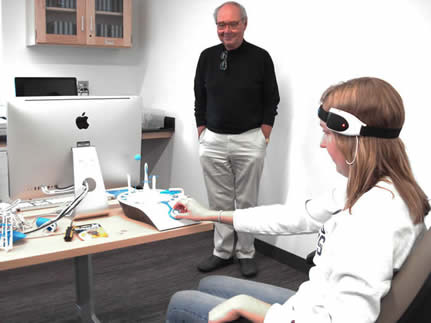
Look closely at the experiment in Dr. Robinson's lab... Emmalynn's ability to concentrate is awesome!
Dates to mark on your calendar...
November 10, 2011 - Psy 234 - Museum Play Day (a partnership between Psy 234 Development classes and the Children's Museum of Southern Minnesota) Saint Peter Community Center
December 13, 2011 - Psychology Research Symposium - Beck Hall, Gustavus
The fall psychology research symposium will take place in Beck Hall on Friday, December 9. Psychology department research symposiums are held near the conclusion of the fall and spring semesters and provide opportunities for Gustavus students to acquaint themselves with research conducted in the psychology department during the semester. Students will display poster presentations and explain their research from 3:30 - 5:00 p.m.. The campus community is welcome.
April 28, 2012 - Minnesota Psychology Undergraduate Conference - hosted by GUSTAVUS! The keynote speaker will be Dr. Laurie Santos. Dr. Santos is an Associate Professor in the Department of Psychology at Yale University (Ph.D. 2003, Harvard University).
Why is this newsletter named Emil's Epilogue? Who is Carl Emil Seashore?
 In the entry lobby of the psychology
department there is a bust of Carl Emil Seashore, an 1891 graduate of
Gustavus. Widely recognized as one of the early leaders in psychology in
America, Dr. Seashore spent most of his professional life at the
University of Iowa. He was a member of the faculty at Iowa from 1897
until his retirement in 1937. In addition to his duties as professor and
chairman of his department, he was made Dean of the Graduate School,
University of Iowa, in 1908 and held that position concurrently with his
other duties for 28 years. He retired in 1937 at the age of seventy but
was recalled as Dean Pro Tempore of the Graduate School in 1942 and
finally retired for the second time in 1946 at the age of 80. Most
people who recognize his name today associate it with the Seashore Tests
of Musical Ability which are still widely used. He was a man of wide
ranging abilities and achievements and certainly one of the outstanding
alumni of Gustavus. Click here for additional biographical information on Carl Emil Seashore..
In the entry lobby of the psychology
department there is a bust of Carl Emil Seashore, an 1891 graduate of
Gustavus. Widely recognized as one of the early leaders in psychology in
America, Dr. Seashore spent most of his professional life at the
University of Iowa. He was a member of the faculty at Iowa from 1897
until his retirement in 1937. In addition to his duties as professor and
chairman of his department, he was made Dean of the Graduate School,
University of Iowa, in 1908 and held that position concurrently with his
other duties for 28 years. He retired in 1937 at the age of seventy but
was recalled as Dean Pro Tempore of the Graduate School in 1942 and
finally retired for the second time in 1946 at the age of 80. Most
people who recognize his name today associate it with the Seashore Tests
of Musical Ability which are still widely used. He was a man of wide
ranging abilities and achievements and certainly one of the outstanding
alumni of Gustavus. Click here for additional biographical information on Carl Emil Seashore..
Click here for Previous Alumni Updates
Introducing the first of what could be a long tradition... Psych Majors.... Follow the wafting aroma of fresh popcorn to Beck 271 on Friday afternoons and meet the newest member of the department... Dr. Poppsolat...
Research and Career Opportunities
-
The Brain, Cognition, and Development (BCD) Lab, directed by Dr. Lisa Scott at the University of Massachusetts Amherst anticipates hiring a full time Lab Manager to work on studies aimed at understanding the processes and previous experiences important for perceiving and recognizing faces and objects in infants and adults. The BCD lab uses longitudinal training designs and behavioral, electrophysiological (event-related potentials; ERPs), and eye-tracking methods, to further understand the perceptual, cognitive, and social experiences that enhance or constrain face and object processing. To learn more about our work please see our website: http://www.people.umass.edu/lscott/ Please see the attached job description/information. If you are interested in applying please email your CV/resume to: Lisa S. Scott, Ph.D. Assistant Professor Department of Psychology 413 Tobin Hall/135 Hicks Way Amherst, MA 01002 office phone: 413-545-5965 email: lscott@psych.umass.edu The Department of Human Development has an immediate opening for a part time (33 hours per week) Research Aide III to serve as lab manager for the Early Childhood Cognition Lab under the direction of Dr. Tamar Kushnir. - Cornell University The lab manager will coordinate research on causal reasoning and social cognition in infants and young children. This individual will work closely with the PI/supervisor and graduate students, postdocs and research assistants to ensure smooth functioning of an active research laboratory. Primary responsibilities include conducting experiments with infants, children and adults in laboratory and school-based settings; recruitment of new participants; training and supervising undergraduate research assistants; administrative supervision of data management procedures, maintenance of budgets and RA schedules, regular updating of lab web page and dissemination materials, regular updating of participant recruiting systems; providing general support to PI, graduate, and post-doctoral researchers. Additional responsibilities include: PC & Mac computer trouble-shooting, simple network administration; laboratory equipment trouble-shooting, testing, and maintenance (and supervision thereof); creation and management of scheduling procedures for use of laboratory space and equipment; laboratory development – policies, procurement, and guidelines, including updates for improvement. Qualifications Associates degree plus 1-2 years experience, or equivalent combination of education and experience. Bachelor's degree preferred. Requires research experience, and an understanding of appropriate communication with young children and their families and caregivers. Must possess excellent organizational, interpersonal, written and oral communication skills, as well as leadership skills. Must have working knowledge of Word and Excel, basic familiarity with PC and Mac computer software and hardware and be able to learn new software quickly. Cornell University, located in Ithaca, New York, is an inclusive, dynamic, and innovative Ivy League university and New York's land-grant institution. Its staff, faculty, and students impart an uncommon sense of larger purpose and contribute creative ideas and best practices to further the university's mission of teaching, research, and outreach. Cornell University is an equal opportunity, affirmative action educator and employer. To apply, go to: http://www.hr.cornell.edu/jobs/positions.html Search for position title "Research Aide III-15666"

